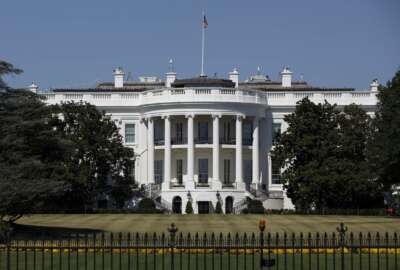

Dan Blair, a long time servant of the federal government, is about to apply his experience to one of the most fraught processes — presidential transition.
Best listening experience is on Chrome, Firefox or Safari. Subscribe to Federal Drive’s daily audio interviews on Apple Podcasts or PodcastOne.
An old hand at the inner workings of government is about to apply his experience to one of the most fraught processes. Presidential transition. Dan Blair is former deputy director of the Office of Personnel Management among other federal jobs. He’s former president of the National Academy of Public Administration, and senior counselor at the Bipartisan Policy Center. Now he’s headed to the Center for Presidential Transition at the Partnership for Public Service. Mr. Blair joined Federal Drive with Tom Temin to discuss his new role.
Interview transcript:
Tom Temin: Let’s talk about the Center for Presidential Transition. You are coming before a major presidential election. I guess my first question is, if a particular president is re-elected, does that change in administrations or change in terms also rank as a transition?
Dan Blair: You will see a transition in the second term of presidency. If the incumbent is reelected. You’ll see substantial turnover in the senior positions and particularly in the ones requiring Senate approval.
Tom Temin: Now that you are there, what are you gonna do there?
Dan Blair: We’re gonna look at the appointments process and determine ways to make it less burdensome for the nominee. Right now that nominees face a high hurdle when it comes to Senate confirmation. President Trump has seen the slowest confirmations I think of any president in recent history. So we want to look at this and say, how can we make it less burdensome, less costly, less time delays for the nominee, while giving the Senate the appropriate time and the appropriate opportunity to act on its advice and consent authority that the Constitution grants it.
Tom Temin: What are the biggest impediments to fast confirmations? Sometimes it’s months and months before people even get to a hearing.
Dan Blair: It is months and months. A number of times it can be the filing the financial disclosure forms. Many nominees may not be aware of the intricacies of filing these forms in which OGE (Office of Government Ethics) looks for conflicts of interest. Often times the forms that they’ve filled out in the White House are very different from the forms that the Senate requires, so we want to look at seeing if there’s a way of streamlining that process as well. In addition, there are so many Senate confirmed positions. We want to look at whether or not all those positions require presidential appointment and Senate confirmation or whether some can just become presidential appointments. Remember, a number of these are part time boards and commissions as well. The Senate acted with S. Res. 116 in naming a number of these positions as privileged and could go to the executive calendar if there were no objections and maybe, here may be some more of these positions that could be added to that list. So there are a whole host of potential reforms out there. We also want to talk to other nominees to see what their experiences have been and what they think could be improvements to the process, as well as to key Senate staff looking at this and saying, how can we make the jobs of our senators easier by looking at advice and consent at the same time helping the nominees get through? We don’t want to see these keys position go vacant for long periods of time. It’s not good for our government. It’s not good for the country.
Tom Temin: In other words, in part you’re going to look at the differences between, say, being nominated for administrator of the Environmental Protection Agency, which can be a very highly politicized process versus simply being nominated for an advisory board on this that or the other.
Dan Blair: For the Harry Truman Scholarship Fund, for example, exactly. Should they go through the same process or can one be expedited? And if one is expedited, maybe that allows more time or more staff resources to look at the more important ones. Not necessarily meaning delay it all but meaning that they can focus their attention on the real work rather than having to have it spread among a whole host of different positions that are not equal in weight.
Tom Temin: You’re going to go about this study basically by talking to the parties involved, sounds like?
Dan Blair: We’re gonna be talking to past staff with presidential appointments. We’re gonna be talking with Hill staff. We’re gonna be talking with past nominees. We’re gonna be doing a 360 degree interview process of all potential stakeholders. We know where the problems are. We need to identify more solutions.
Tom Temin: Sounds like some of the solutions might be able to be executed by maybe regulation, but some would require legislation.
Dan Blair: Some may require legislation. We want to build a bipartisan coalition among Senators, among members of Congress in order to see that we can get these positions filled more quickly and at the same time allow of a true vetting process to honor the advice and consent requirements of the Constitution.
Tom Temin: Are you aware of this point of any Senators that have expressed a need for this or have expressed that sense that it’s time to reform this thing after all these years?
Dan Blair: Well Senator Coons has been a strong ally of this in the past. We’re talking with Senators on the authorizing committee. We think that there may be, I think, privately, I think a number Senators will express a dissatisfaction with the current process, and so we hope to be able to find that intersection of where they can reach agreement and move forward on some legislative reforms. We’re very, very early in this process, however, and we want to start talking and learning more from those who are involved.
Tom Temin: Do you have a timeline of completing the study before this election or before this next transition?
Dan Blair: It will be more than a study, it’ll be a series of seminars, it’ll ill be a series of podcasts, it’ll be a whole host of different media outlets and formats in which we highlight these problems and offer up solutions. The initial stages and the major bulk of this work should be completed in time for the next inauguration.
Tom Temin: Regardless then there’s a transition even if Mr. Trump is re elected or someone else’s elected in his place.
Dan Blair: Exactly,because our data shows that there is a substantial amount of turnover in the first 6 months of a new administration. So you’re gonna have vacancies. You have folks who have served the first 4 years or first or three years, and those folks will want to move on to different positions. The president would want to bring in some new people in order to carry out his second term administration should he have one. So that’s where you see a transition in second term. It’s not unique to President Trump. President Obama went through the same thing and President Bush as well.
Tom Temin: Having watched all of this for so many years and from the perches that you’ve had, do you sense that it’s getting worse, that the process is getting more convoluted and taking longer and longer as it ratchets through history?
Dan Blair: Our data shows that President Trump’s nominees really having encountered the longest delays of any administration that we’ve looked at in the last probably four or five administrations. So it’s getting much more onerous. It’s much more adversarial. If we can ratchet it down a notch or two, it would be good for the American people. Irregardless of the administration, there are key positions to fill. And if you can’t fill those positions because you’ve thrown too many hurdles that potential nominees, if it’s onerous ethics requirements, if it’s an onerous confirmation process, if it’s delays, if it’s costly to the potential nominee, good people are not going to be encouraged to serve. We want to get the best people regardless of the administration who want to serve the country nd so making this process fairer while still giving the Senate the opportunity to act on its advice and consent, it strike the correct balance and we can get these positions filled faster and with better people.
Tom Temin: Dan Blair is senior counselor at the Center for Presidential Transition at the Partnership for Public Service. Thanks so much for joining me.
Dan Blair: Thank you. It’s great to talk to you.
Copyright © 2025 Federal News Network. All rights reserved. This website is not intended for users located within the European Economic Area.


